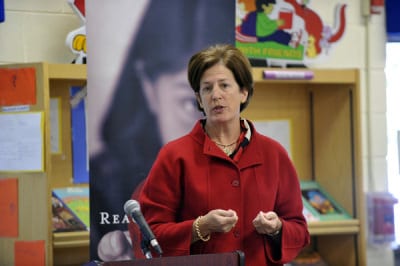

Charlotte-Mecklenburg Schools outpaced the rest of the state on the first North Carolina School Performance Grades, but leaders say they’re not satisfied with the results — particularly troubling reading grades for the district’s elementary schools.
“We have work to do and we acknowledge we have work to do,” said CMS Chief Accountability Officer Frank Barnes.
Seventeen CMS schools, or 11 percent, received an A; 47 schools, or 30 percent, earned a B. The 41 percent of CMS campuses earning an A or B is better than the 29 percent of schools that received those grades statewide.


Forty-six CMS schools earned a C. That represents 29 percent of the district’s schools. Thirty-six, or 23 percent, received a D and 11 schools, or 7 percent, earned an F. Schools in less affluent—and largely minority—communities generally received the lowest grades.
“We want to get better, and we’re committed to do that,” said Superintendent Ann Clark, who said the school grades are an important evaluation of school success—but not the only one. “This is one snapshot, one data point, among many.”
School principals, including those at schools receiving poor grades, shared that sentiment.
“It does not by any means define the work that the parents, the staff, my partners or our scholars do in a given day,” said Gwen Shannon, the principal at Westerly Hills Academy, a PreK-8 school in West Charlotte. The school received a score of 42, or a D. “We’re going to, as sure as you can believe, work harder, work more effectively and work smarter to grow these students every day.”
Focus on literacy
District leaders said they were especially concerned that 44 percent of the school system’s elementary campuses earned Ds or Fs for their reading scores.
“Literacy is our North Star,” Clark said. “We also hear the clock of urgency ticking.”
She said the district has already implemented literacy interventions in struggling schools—everything from new technology to data-driven teaching methods—in an attempt to boost reading proficiency.
Clark also highlighted Read Charlotte, a $5.5 million public-private partnership announced last week with a goal of doubling CMS third grade reading proficiency from 40 percent now to 80 percent in a decade. “It feels like they are the wind beneath our wings,” Clark said.
The superintendent reiterated that, while the individual school grades were released last week, schools knew their testing results nine months ago and had a general idea of how they were doing. CMS has been working for years to develop what it calls an “accountability framework” that would measure a long list of factors that influence school success.
“Clearly we didn’t start this week on this work,” Clark said.
Concerns about growth
Although CMS officials say they “own” the results at the district’s schools, they did raise concerns about the formula used to calculate the school grades. Eighty percent of a grade is weighted toward academic performance, or test scores, while 20 percent focuses on academic growth, or the progress students make during the course of an academic year.
Eighty-three percent of CMS schools met or exceeded their expected growth, compared to 75 percent of schools statewide.
The Charlotte-Mecklenburg Board of Education this year is asking the General Assembly to consider adjusting the formula to a 50-50 split.
“We know that growth is a way toward proficiency,” Clark said. Eighty-three percent of CMS schools met or exceeded their expected growth, compared to 75 percent of schools statewide.
Principals said growth is an important measure of how their teachers perform.
“We want to be able to grow our students from when they come into sixth grade to when they move on to high school so they can be prepared for college,” said Marc Angerer, principal at Carmel Middle School, which earned a score of 77, or a B. He said his teachers want to “prepare students for what’s next, not just prepare them for a test.”
Because growth is an important metric in teacher evaluations, Clark said it should also be a more significant component of the school grades. “There’s clearly a mixed message that’s being sent to the schoolhouse and specifically our teachers.”
Regardless of how they are calculated, though, Clark said the grades should be a reminder to the community not to give up on struggling schools, just as a teacher would not abandon a student who earns a bad grade.
“A failing grade or a disappointing grade is one grade on one paper or test,” she said. “It does not reflect the cumulative effort they might make in a course.”


